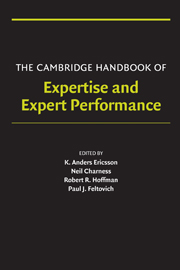Book contents
- Frontmatter
- Contents
- Acknowledgments
- Contributors
- PART I INTRODUCTION AND PERSPECTIVE
- PART II OVERVIEW OF APPROACHES TO THE STUDY OF EXPERTISE – BRIEF HISTORICAL ACCOUNTS OF THEORIES AND METHODS
- PART III METHODS FOR STUDYING THE STRUCTURE OF EXPERTISE
- PART IV METHODS FOR STUDYING THE ACQUISITION AND MAINTENANCE OF EXPERTISE
- 15 Laboratory Studies of Training, Skill Acquisition, and Retention of Performance
- 16 Retrospective Interviews in the Study of Expertise and Expert Performance
- 17 Time Budgets, Diaries, and Analyses of Concurrent Practice Activities
- 18 Historiometric Methods
- PART V DOMAINS OF EXPERTISE
- PART VI GENERALIZABLE MECHANISMS MEDIATING EXPERTISE AND GENERAL ISSUES
- Author Index
- Subject Index
- References
17 - Time Budgets, Diaries, and Analyses of Concurrent Practice Activities
from PART IV - METHODS FOR STUDYING THE ACQUISITION AND MAINTENANCE OF EXPERTISE
- Frontmatter
- Contents
- Acknowledgments
- Contributors
- PART I INTRODUCTION AND PERSPECTIVE
- PART II OVERVIEW OF APPROACHES TO THE STUDY OF EXPERTISE – BRIEF HISTORICAL ACCOUNTS OF THEORIES AND METHODS
- PART III METHODS FOR STUDYING THE STRUCTURE OF EXPERTISE
- PART IV METHODS FOR STUDYING THE ACQUISITION AND MAINTENANCE OF EXPERTISE
- 15 Laboratory Studies of Training, Skill Acquisition, and Retention of Performance
- 16 Retrospective Interviews in the Study of Expertise and Expert Performance
- 17 Time Budgets, Diaries, and Analyses of Concurrent Practice Activities
- 18 Historiometric Methods
- PART V DOMAINS OF EXPERTISE
- PART VI GENERALIZABLE MECHANISMS MEDIATING EXPERTISE AND GENERAL ISSUES
- Author Index
- Subject Index
- References
Summary
Introduction
Time is an inescapable dimension of all human activity. What time of day, month, and year, for how long, before or after what other activity, how long before or after another given activity and how often, are questions answerable for all activities. The relevance of each question varies with one's perspective on the activity. Time-use methodology can provide rich, objective, and replicable temporal information to answer the questions posed, hence providing a basis for forming and/or collaborating empirical judgments. Coupled with other objective and subjective contextual information on each incident of an activity, time-use methodologies can generate invaluable information for understanding activities and human behavior. Time-use studies show how people use their time. Minimally, they show what activities people do, while maximally, they can show what people are doing, where they are, who they are with, and how they feel.
Time-use studies can use a variety of data-collection methods ranging from self-reported activities to observation reports. In expertise research, time spent in an activity needs to be considered at a minimum of two different levels: a macro and a micro level. These two different levels encompass different units of time and provide different information about an activity. For example, at a macro level a researcher interested in music expertise may want to assess a typical week of training by analyzing time spent on general activities, such as practice alone, practice with a teacher, playing with others, resting, and so forth.
- Type
- Chapter
- Information
- The Cambridge Handbook of Expertise and Expert Performance , pp. 303 - 318Publisher: Cambridge University PressPrint publication year: 2006
References
- 8
- Cited by

